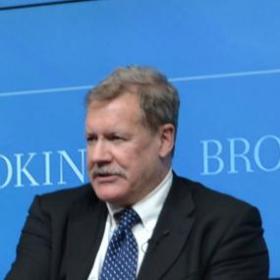
Iran through India's Eyes
The United States has an “obsession with Iran”. This is the view of UK-based academic, Harsh V. Pant, a graduate of two Indian universities, writing in the “Washington Quarterly” earlier this year.
The approach toward Iran from India is very different from that of the United States. In March 2011, India’s National Security Adviser, Shivshankar Menon, visited Tehran for discussion with his counterpart, Saeed Jalili, who is the Secretary of Iran’s Supreme National Security Council (SNSC). Menon also met with President Ahmadinejad, the Foreign Minister, Ali Akbar Salehi, and Speaker of the Majlis, Ali Larijani. In June 2011, the Deputy Secretary of Iran's SNSC, Ali Baqeri, visited India “to attend the joint strategic committee of the two countries”, according to Iran’s Press TV. In July 2011, India’s then Foreign Secretary, Nirupama Rao, visited Tehran for the ninth round of formal ministry level bilateral consultations. Topics included terrorism, energy security, the North-South Transport Corridor, developments in Afghanistan and regional security. The two countries have a joint intergovernmental commission that had its 16th meeting in 2010, when six new agreements on a range of cooperative measures were signed.
Not everything is plain sailing of course. To secure its nuclear agreement with the United States, India had to experience humiliating pressure from Washington, including Congress, on how to conduct relations with Iran. The news this week is that unpaid Indian debts on oil imports from Iran will soon be paid in full, following reports several weeks ago that only two-thirds of the debt would be paid. In recent years, India has been Iran’s second or third biggest oil market (the position varies according to source). This is not surprising given India’s growth, its proximity to Iran, and the fact that Iran is the fourth-largest crude oil exporter in the world.
By contrast, the United States bans all trade with and investment in Iran. In June 2011, India’s representative to the United Nations, Ambassador Hardeep Singh Puri, made an appeal that is in direct and active conflict with the United States’ position. He said: “All efforts should be made to ensure that legitimate trade and economic activities of Iran and other countries do not suffer while implementing the measures sanctioned by the relevant [UN] resolutions.” (These UN sanctions are limited, in broad terms, to the nuclear-related and missile-related entities and activities of Iran, as well as certain military exports to Iran.)
Military ties between Iran and India have been bothering Washington as well. The parameters of this concern are well laid out by Harsh Pant and include direct military to military dialogue and information exchange. Of special interest though are reports from elsewhere, including U.S.-based Symantec and Russian company Kaspersky Lab, that the Stuxnet worm, understood by many analysts to have been designed in the United States or Israel to attack Iran, had by January 2011 infected many more systems in India than in Iran. Regardless of who invented Stuxnet, India and Iran clearly now have common cause in military strategic defence against cyber weapons – and the US or one of its allies may be on the other side.
This past week, an Iranian-flagged ship of the Iran India Shipping line, held by Somali pirates for 5 months, was rescued by the Indian navy, an ordeal and an outcome demonstrating that certain basic daily realities of security bring Iran and India together. Piracy is of course a lower level of concern than the vital strategic interests that India and Iran share in Pakistan and Afghanistan. India and Iran are good neighbors toward each other, even if India does observe the UN sanctions.
The contrast between the Indian and American views of Iran could not be more stark. If Pant is right, then the United States needs help to end its “obsessive” behavior toward Iran. Should the United States look to pull back from its position on broad-ranging trade and investment sanctions against Iran? Obsession may not be compatible with effective diplomacy.
To read Austin's piece online, click here and scroll to pg. 5 of New Europe

